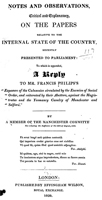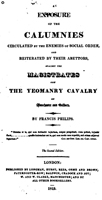
The Peterloo Massacre - Manchester 16th August 1819
TRANSCRIPTION OF : 'NOTES & OBSERVATIONS, Critical & Explanatory, on the Papers Relative to OFFICIAL Head Quarters, My Lord, I most sincerely regret that the employment of military in aid of the civil power should have been necessary; but I trust it will appear to your Lordship, that the utmost forbearance, consistent with their duty, has been evinced by Lieutenant-Colonel L'Estrange, with the troops under his command : and I hope it will meet your approval, his having employed the corps of Cheshire and Manchester Yeomanry Cavalry, who, at the request of the Magistrates, had assembled with the greatest alacrity in full numbers, and had placed themselves at the Lieutenant Colonel's disposal. By the latest account, I understand the town of Manchester has become more quiet. I shall await here a further report, and shall hold in readiness to move at the shortest notice, all the disposable forces under my orders. I have the honour to be, The Right Honourable the Secretary of State, ~~~~~~~~~~~~~~~~~~~~~~~~~~~~~~~~~~~~~~~~~~ Manchester, August 16, I819. Sir, The infantry was in readiness, but I determined not to bring them in contact with the people, unless compelled to do so by urgent necessity; not a shot therefore has been fired by any of the military, though several have been fired by the populace against the troops. (W) I have, however, great regret in stating, that some of the unfortunate people who attended this meeting, have sufered from sabre wounds, and many from the pressure of the crowd. One of the Manchester Yeomanry, if not dead, lies without hope of recovery; it is understood he was struck with a stone. One of the special Constables has been killed. The Manchester Yeomanry under Major Trafford, and the Cheshire Yeomanry under Lieutenant Colonel Townsend, who had come on a very short notice from the county Magistrates (many of them from a great distance,) were most active and efficient in discharge of their duty. - The Committee, now sitting, consider it necessary to keep all the troops ready, though every means will be adopted to prevent the necessity of their acting. I have, &c. Major-General Sir John Byng, K.C.B. Footnotes~~~~~~~~~~~~~~ ~~~~~~~~~~~~~~~~~~~~~~~~~~~~~~~~~~~~~~~~~~ Manchester, August I7, 1819. My Lord, Since their departure, the town has continued to assume a gloomy aspect, as the night has approached, and at this hour (a quarter from ten) all the civil and military authorities are in action throughout the town. Great numbers assembled this evening, from eight to nine, about the New Cross, but did not do any act of violence, though evidently of the description disposed to do so. Soldiers are placed there, and bodies of special constables, with orders in the first instance for the constables to act, and afterwards, in case of need, the military to disperse the mob. The riot act was not read this evening when I first went up, about six o'clock, though some stones had before been thrown at one or two houses, and a few at the military; yet l found matters peaceable and quiet, and the offending parties straggling about, and at considerable distances, and I hoped they would disperse. They did not, however, disperse; but the numbers considerably increased at the distances, and I found it necessary to communicate instantly with Col. L'Estrange, &c. The military have, in consequence, been strengthened in that quarter, and at present, every thing, I believe, remains quiet, although it can alone be attributed to the full exertion or appearance of the military strength. I am, my Lord, To Viscount Sidmouth. ~~~~~~~~~~~~~~~~~~~~~~~~~~~~~~~~~~~~~~~~~~ Examination of James Murrey, of No. 2, Withy Grove, Manchester, Confectioner, who, on his Oath, saith, That on Sunday last, the 15th instant, he was at White Moss, near Middleton, about five miles from Manchester, between three and four o'clock in the mornirig, and saw there assembled between 14 and 1500 men; the greatest number of whom were formed in two bodies, in the form of solid squares; the remainder were in small parties of between twenty and thirty each; there were about thirty such parties, each under the direction of a person acting as a drill serjeant, and were going through military movements; that Examinant went amongst them, and immediately one of the drill serjeants asked him to fall in. He said, he thought he should soon, or gave some such answer; he then began to move away; upon which, some persons, who were drilling, cried out "Spies." - This Examinant, and William Shawcross, and Thomas Rymer, and his son (all of whom had accompanied this Exarninant from Manchester), continued to retire; the body of men then cried out, "Mill them, murder them." Near one hundred men then pursued this Exarninant and his companions; they overtook them near a lane end, at the edge of the Moss, and began to pelt them with clods of earth - they at last came up to the Examinant and his companions, and beat them very severely - Examinant begged they would not murder him; but the general cry was, "Damn him, kill him - murder him." Examinant said, "You treat me very differently to what nations treat each other's prisoners when they are at war. Suppose that I am an enemy, you ought to treat me as a prisoner:" they said, "How will you treat us, if you take us prisoners when we come to Manchester?" Examinant knew at the time that a meeting was appointed for the next day (Monday) at Manchester. The men kept beating Examinant all the time; at last they debated among themselves whether they would kill Examinant or forgive him, and they determined to forgive him, provided he would go down upon his knees and beg pardon to them, and swear never to be a king's man again, or to mention the name of a king. Examinant complied, to save his life, they standing over him with sticks, as he apprehended, to murder him, provided he had objected. They afterwards went away. Examinant was not previously acquainted with any of the persons assembled that he saw, but is certain that he should know again two of those who beat him. The greatest part of the number assembled had stout sticks, from three to four feet long. In consequence of the ill treatment received by Examinant as above, he was confined to his bed for three days. Footnotes~~~~~~~~~~~~~~ ***************************************************************
'NOTES & OBSERVATIONS, Critical & Explanatory, on the Papers Relative to the Internal State of the Country, Recently Presented to Parliament; to which is appended, a REPLY to Mr. Francis Philips's 'Exposure of the Calumnies circulated by the Enemies of Social Order ...' Transcribed by Sheila Goodyear 2019 LINK to full .pdf document of 'Notes & Observations ...'
on the Internet Archive website to read or download. |
||||||||||||||||||||||||||||||||||||||||||||||||||||||

